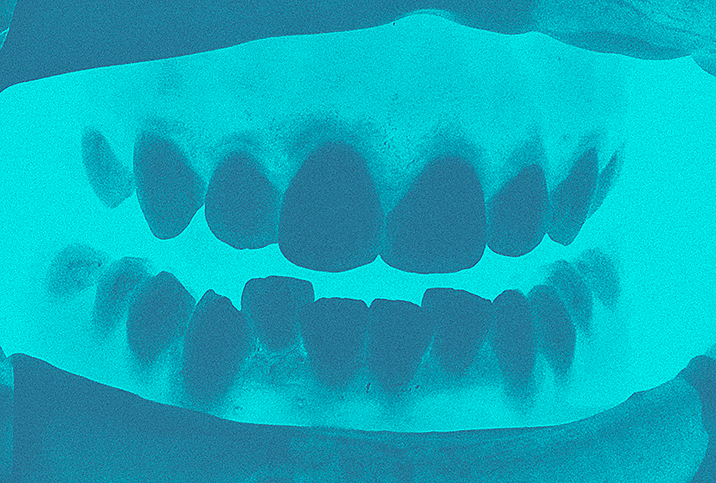Sink Your Teeth Into This: Regular Dental Care May Help Erections

Talk-show host Ellen DeGeneres has an old joke about an aunt who died of gum disease. By the end of the joke, we come to find out the aunt got chewing gum stuck in both of her eyelids, couldn't see and wandered onto train tracks. You can fill in the blanks as to what ensued.
That roundabout link between the aunt's death and gum disease is similar to the connection between gum disease and erectile dysfunction: The former leads to many conditions that can contribute to ED. In this case, A might not equal B, but A+B+C+D can equal ED.
Research indicates poor oral health may be related to poor erections. A 2012 Turkish study published in the Journal of Sexual Medicine found that men in their 30s who had severe periodontal (gum) disease were three times more likely to have erectile dysfunction, the persistent inability to maintain an erection firm enough for sex.
Chinese researchers analyzed several studies involving a total of 213,076 participants and found patients with periodontal disease were 2.85 times more likely to be diagnosed with ED.
However, there isn't enough conclusive evidence to show chronic inflammation of the gums and ED are directly linked, according to James Wilson, D.M.D., president of the American Academy of Periodontology (AAP).
It's possible gum disease may lead to penile blood vessel inflammation and damage, affecting erectile function.
"What often happens is that the bad habits that lead to gum disease, such as smoking or an unhealthy diet, can contribute to other conditions in the body, such as erectile dysfunction," Wilson said via email, adding that while studies suggest an association between ED and periodontal disease, the AAP believes more research is needed to conclusively link the two.
This purported connection has to do with vascular inflammation, according to Robert Schifferle, D.D.S., M.M.Sc., Ph.D., director of the Periodontal Research Center at the University at Buffalo in New York. Since our bloodstream runs to gum tissue and bone, the bacteria from gum disease can enter the bloodstream and get distributed throughout the body, triggering inflammation in the blood vessels.
It's possible gum disease may lead to penile blood vessel inflammation and damage, affecting erectile function. In fact, ED, because of its ties to vascular issues, is often one of the first signs of heart disease.
People with periodontal disease have two to three times the risk of having a heart attack or stroke, although the link may not be direct, according to a Harvard Health report.
"I think it is suggestive," Schifferle said of the studies on gum disease and ED. "I can't say that if you treat periodontal disease, you're not going to have a stroke or diabetes or ED or respiratory disease, but the studies do show that it helps."
What is periodontal disease?
Periodontal disease is a chronic infection of the gums, or gingiva, the tissues that hold the teeth in place.
People who don't brush or floss allow bacteria to accumulate and get a low-grade bacterial infection, Schifferle explained. Infection, as it is wont to do, brings white blood cells to the area, which try to eliminate the bacteria, resulting in inflammation as a byproduct.
In advanced stages, periodontal disease can lead to bleeding gums, pain while chewing and even tooth loss.
The inflammation from periodontal disease is associated with more than 60 diseases, such as heart disease, stroke, diabetes and Alzheimer's, said Wayne Radwanski, D.D.S., owner of South Austin Dental in Austin, Texas.
"The mouth is a great place for inflammation because we have bacteria, we have viruses, we have yeast. Lots of things grow in the mouth," he said, adding that the most noticeable symptom of periodontal disease is blood. "If you're brushing or flossing and you have blood in your mouth, you've got inflammation. That's your immune system rushing these T-cells to the site, trying to protect from that invasion."
Other symptoms of gum disease include bad breath; red, swollen or tender gums; new spaces developing between the teeth; gums that recede from the teeth; and pus between the teeth and gums.
Gum disease is especially common in people with diabetes, Radwanski said. If diabetes is not controlled, it can lead to higher blood sugar levels in the fluids of the mouth, which promotes the growth of bacteria, setting the stage for periodontal disease.
Periodontal disease treatment
Most commonly, periodontal disease is treated through nonsurgical means, including scaling and root planing—these are often known as a deep cleaning—followed by maintenance appointments once the disease is under control. However, this path isn't enough for many patients, especially those with moderate to severe gum disease, according to Wilson. These patients often require more advanced therapies to fully control their periodontal disease.
If severe periodontal disease is not treated and controlled, people may lose their teeth and experience chronic infections throughout the entire mouth.
"You don't want an ongoing infection anywhere in the body," Radwanski said.
Prevention tips and risk factors
Periodontal disease prevention starts with seeing your dentist twice a year for routine cleanings, Radwanski said. Trips to the dentist are especially important if you have moderate or severe bone loss from gum disease.
"My advice is to follow up and listen to the hygienists," he said.
The three main risk factors for periodontal disease are smoking, genetics and diabetes, according to Schifferle.
"If I look at the 20 worst patients that I've seen in the last 40 years, I would guess 80 to 90 percent of them were smokers," Schifferle said, while pointing out you can still get severe gum disease even if you don't smoke.
Tying periodontal disease and ED together a little more, research indicates men who smoke are also at higher risk for ED.
A urologist's perspective
Bobby Najari, M.D., a urologist at NYU Langone Health in New York City, said he has not had a patient with ED who he knew had periodontal disease, but he doubts it's because that has never been the case. He attributes it more to the fact that a urology office does not commonly screen for gum disease. Ideally, though, screening for periodontal disease would be routine in the management of ED.
"It's not one of the traditional risk factors that are taught in medical school, like diabetes, heart disease, high blood pressure and smoking," he said.
But he believes periodontal disease should be seen as a risk factor for ED.
"I think there's enough data to suggest that it should be at least considered," Najari said.


















